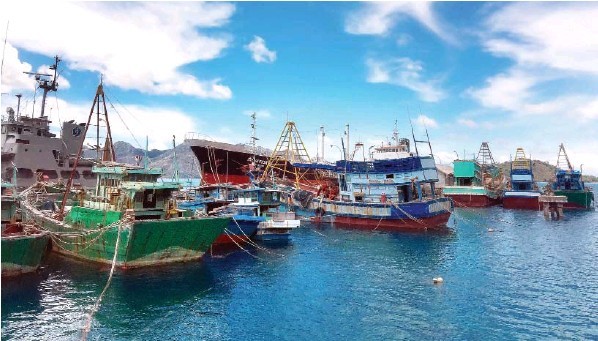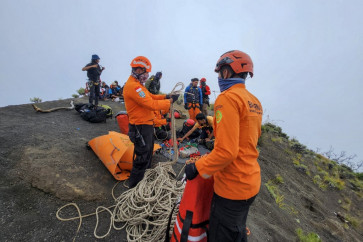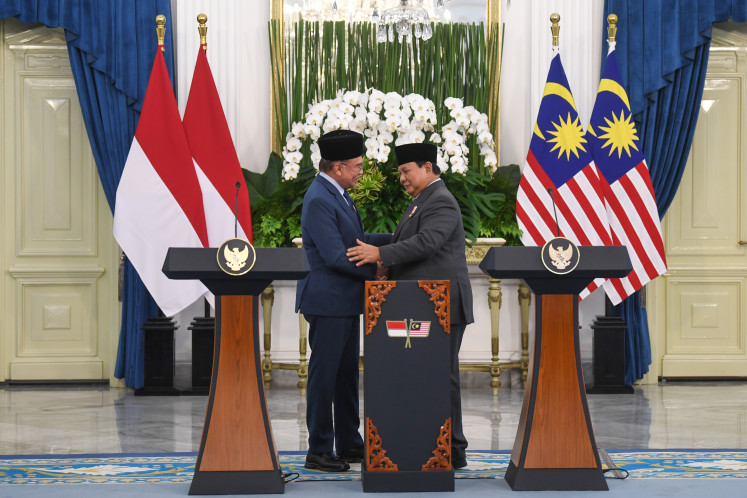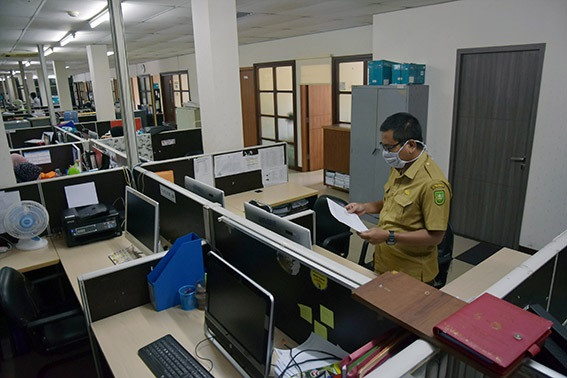Popular Reads
Top Results
Can't find what you're looking for?
View all search resultsPopular Reads
Top Results
Can't find what you're looking for?
View all search resultsRemote island at center of coming storm
Change text size
Gift Premium Articles
to Anyone
 Doomed: Seized foreign ships moor off the northern tip of Bunguran island in Natuna regency, Riau Islands, on Thursday. The government is to sink the ships, pending a court decision. (JP/Rendi A. Witular)
Doomed: Seized foreign ships moor off the northern tip of Bunguran island in Natuna regency, Riau Islands, on Thursday. The government is to sink the ships, pending a court decision. (JP/Rendi A. Witular)
T
he pristine waters around Bunguran, the closest Indonesian island to China’s disputed territory in the South China Sea, is a graveyard for 30 foreign vessels: one from China, most of the rest from Vietnam and Thailand.
Another 28 fishing vessels, including one from China, will confront a similar fate this year, victims of Indonesia’s most stringent campaign to date against poachers, over the course of which 170 foreign vessels have been destroyed.
Riau Islands’ Bunguran, where Natuna regency’s capital Ranai is located, has gained prominence in the past year as the epicenter of the campaign against illegal fishing and a flashpoint in a threatened territorial dispute between Indonesia and Asia’s military top dog, China.
Of the thousands of islands that make up the Indonesian archipelago, Bunguran lies the closest to the nine-dash line, a demarcation used by China as the basis of its unilateral claim to a majority of the resourcerich South China Sea.
Unlike the Philippines, Vietnam, Malaysia and Brunei, Indonesia is not a claimant in the dispute, but around 83,000 square meters of Indonesia’s exclusive economic zone (EEZ) near Bunguran is included within the area demarcated by the nine-dash line.
It is on this basis that China’s coast guard and fishing fleet often operate there, claiming the waters to constitute part of the country’s “traditional fishing grounds”.
The waters are unavoidably a hotbed of potential conflict, not only with China but also with Vietnam and Thailand, given the area’s prominence as one of the few remaining homes to abundant fishery resources.
The Indonesian Navy came to the brink of a fully-fledged dispute with China’s coast guard on May 27 in the course of an attempt to detain Chinese fishing vessel Gui Bei Yu 27088 for alleged poaching.
Ziang Tuang Chean, the Gui Bei’s captain, put up a fight in his attempt to evade the arrest. Before surrendering, he hailed a Chinese coast guard vessel operating nearby and broke the ship’s steering to hinder the Navy’s attempts to tow it to a nearby base, allowing the coast guard time to intervene.
When the Gui Bei was towed by the Navy’s Oswald Siahaan to the nearby Ranai naval base in Bunguran, the Chinese coast guard vessel shadowed the 49-year-old destroyer, engaging in provocative maneuvers and demanding the Navy release the Gui Bei.
“It was very close to open conflict,” said Ranai naval base commander Col. Arif Badrudin.
“It was not until we called for back-up that the coast guard left our territory.”
Navy ships and personnel stationed in Bunguran have been on high alert since March following a confrontation in the same area, when a Chinese coast guard vessel rammed a Chinese fishing vessel, the Kway Fey 10078, in order to release it from Indonesian custody after it had been seized by a Maritime Affairs and Fisheries Ministry patrol boat.
The Navy and the ministry suspect the Chinese coast guard of conspiring to allow their countrymen’s fishing boats to fish in Indonesia’s waters and of having in place a “standard operating procedure” (SOP) for when the vessels are intercepted by the Indonesian authorities.
On both occasions, the captains of the encroaching ships have attempted to contact the coast guard and disable the ships’ steering, destroy their fuel pumps and damage their cold storage.
“It seems there is an SOP in place for China fishing vessels that are about to be detained,” said the operations director of the ministry’s antiillegal fishing task force, Rear Admiral Didik Wahyudi.
Captain Ziang of the Gui Bei denied the allegations, but admitted he made visual contact with the coast guard at least once a week.
Ziang was also aware that he had been operating in Indonesia’s EEZ in the South China Sea. “It was my third time fishing in the area before being caught by the Indonesian Navy,” Ziang said through an interpreter on Thursday.
“I am aware that I was operating in Indonesian waters. There are still many more fish there than in other areas,” he said, adding that it had taken him around a week to arrive in Natuna from port in Guangxi, China.
The ship was caught red-handed by the Navy with its net submerged in Natuna waters; upon seizure, it was revealed to have caught 10 of a planned 60 tons of fish.
The Navy seized the vessel and arrested its eight-strong crew as a warning to the world that the Indonesian Military would not tolerate any breach of Indonesian sovereignty by foreign vessels.
Ziang and his crew are currently detained at the Ranai base.
“We were forced to detain them because they resisted arrest and we were afraid they might cause a nuisance,” said Col. Arif.
Only the captain, chief mechanic and fishmaster will face prosecution for the violations; the remaining crew members will be sent home.
The naval base, surrounded by pristine beaches, was previously used to hold more than 120 Vietnamese men caught fishing illegally last year. Thirteen remain on the island, as no families in Vietnam have claimed them, and the Navy is continuing to bear the costs of feeding them.
With the island set to become a detention hub for those arrested for illegal fishing, the Maritime Affairs and Fisheries Ministry is considering setting up the infrastructure needed to facilitate the Navy to up its pressure on illegal fishing.
The ministry already has a remote outpost and facility on the island of fewer than 70,000 people to monitor illegal fishing in the area.
“The ministry has an interest in better equipping the island to combat poachers and help strengthen territorial defense. No other islands in Indonesia serve this strategic role,” said Didik. (bbn)









